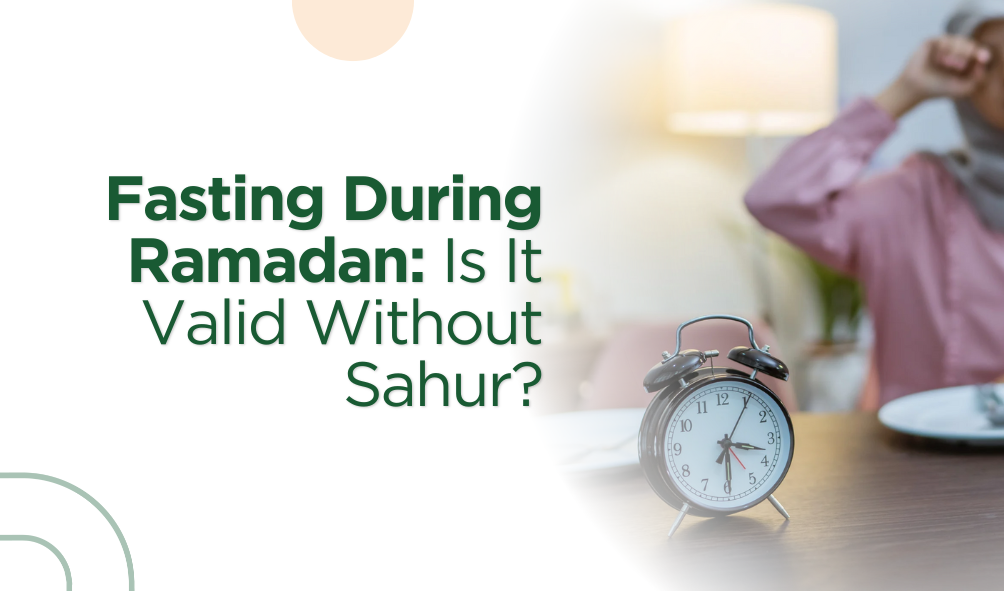Have you ever overslept and missed sahur, then panicked because your fasting during Ramadan was invalid? Don’t worry, don’t be in a hurry to worry! Let’s discuss thoroughly whether fasting during Ramadan without sahur is still valid according to sharia.
Fasting During Ramadan But Not Eating Sahur, Is It Possible?
Many people think that sahur is obligatory. In fact, sahur is actually a highly recommended sunnah, not a requirement for the validity of fasting during Ramadan. The Prophet Muhammad ﷺ said:
تَسَحَّرُوا فَإِنَّ فِي السَّحُورِ بَرَكَةً
“Eat sahur, because in sahur there is blessing.” (Narrated by Bukhari no. 1923 and Muslim no. 1095)
This hadith clearly emphasizes the virtue of sahur, but does not mention sahur as a determinant of whether or not fasting during Ramadan is valid. So, if you don’t have time for sahur, your fasting during Ramadan is still valid as long as you have had the intention the night before.
Also read: 6 Tips to Stay Productive During Ramadan
Intention is the Main Key
The requirement for a valid obligatory fast like fasting during Ramadan is to have the intention at night before dawn. This is in accordance with the words of the Prophet Muhammad ﷺ:
مَنْ لَمْ يُبَيِّتِ الصِّيَامَ قَبْلَ الْفَجْرِ فَلَا صِيَامَ لَهُ
“Whoever does not intend to fast at night before dawn, then his fast is invalid.” (Narrated by An-Nasa’i no. 2331, authenticated by Al-Albani)
This means that as long as you have the intention from the night before, even if you don’t eat sahur, your fasting during Ramadan is still valid. So, sahur is like “additional fuel” to keep you strong all day, but it does not determine the validity of your fasting during Ramadan.
Sahur intention is also part of the intention to fast. While saying the intention out loud isn’t mandatory, having the determination in your heart including the intention to have sahur strengthens your resolve to observe the fasting during Ramadan sincerely. Some people even prefer to renew their sahur intention every night to ensure their commitment remains strong.
Interestingly, the intention to fast is enough in the heart, it does not have to be said. As long as you are aware and have the determination to fast the next day, that is considered an intention. So, no need to be complicated, right?
Also read: Tips for a Productive I’tikaf During the Last 10 Nights of Ramadan
Why is Sahur Still Recommended?
Even though your fasting during Ramadan is valid without sahur, don’t take it lightly. Sahur has many benefits, not only for physical strength, but also blessings. In another hadith, the Messenger of Allah ﷺ said:
إِنَّ اللَّهَ وَمَلَائِكَتَهُ يُصَلُّونَ عَلَى الْمُتَسَحِّرِينَ
“Indeed, Allah and His angels send blessings upon those who eat sahur.”(Narrated by Ibn Hibban, 3467, authenticated by Sheikh Al-Albani)
Imagine, Allah ﷻ and the angels pray for those who eat sahur. Who doesn’t want to receive prayers from the angels?
In addition, sahur also differentiates the fasting during Ramadan of Muslims from the fasting of previous peoples. The Messenger of Allah ﷺ said:
فَصْلُ مَا بَيْنَ صِيَامِنَا وَصِيَامِ أَهْلِ الْكِتَابِ، أَكْلَةُ السَّحَرِ
“The difference between our fasting and the fasting of the People of the Book is eating sahur.” (Narrated by Muslim no. 1096)
So, sahur is a kind of “characteristic” of Muslims that other people don’t have. Cool, right?
Also read:The Virtues of the Month of Ramadan: Time to Harvest Rewards!
Overslept and Forgot Your Intention, What Should We Do?
If you overslept and didn’t have time for sahur, but had made an intention before going to bed, don’t worry, your fasting during Ramadan is still valid. But if you completely forget your intention until after dawn, well, this is invalid.
If the case is you wake up when the dawn call to prayer sounds and just remember and haven’t made an intention, unfortunately you have to make up for it another day. But if you had made an intention in your heart beforehand, even if you overslept and only woke up at dawn, your fasting during Ramadan is still safe.
Also read: Intention of Fasting in Ramadan: Obligatory or Sunnah? Here’s the Explanation!
What About Sunnah Fasting?
Well, the rules for sunnah fasting are different. You can make an intention even after dawn, as long as you haven’t eaten or done anything that breaks the fast. Rasulullah ﷺ once did this:
عَنْ عَائِشَةَ قَالَتْ دَخَلَ عَلَيَّ النَّبِيُّ صَلَّى اللَّهُ عَلَيْهِ وَسَلَّمَ ذَاتَ يَوْمٍ فَقَالَ هَلْ عِنْدَكُمْ شَيْءٌ فَقُلْنَا لَا قَالَ فَإِنِّي إِذًا صَائِمٌ
“From Aisha, she said, ‘The Messenger of Allah ﷺ entered my house one day and asked: “Do you have food?” We replied, “No.” He said: “Then I will fast.”‘ (Narrated by Muslim no. 1154)
So, if you want to fast sunnah and just remember after Subuh, as long as you haven’t eaten or drunk, you can still continue fasting.
Conclusion: Fasting Without Sahur, Valid But…
So, sahur is not a requirement for valid fasting during Ramadan. As long as you have the intention from the night before, your fasting during Ramadan is still valid even if you don’t have sahur. But don’t make this an excuse to deliberately skip sahur, because sahur is full of blessings and there are prayers from Allah ﷻ and the angels.
Sahur intention may not be obligatory, but it enhances the spiritual and physical benefits of fasting during Ramadan. If you don’t have time for sahur because you overslept, don’t be sad. The important thing is that the intention is there, worship continues, and may your fasting during Ramadan be accepted by Allah ﷻ.
Also read: How to Manage Your Sleep Time During Ramadan

Let’s Visit, Zeed and join for halal investment with Zeed.
References:
Al-Qur’an Al-Karim https://tafsirweb.com
Al-Bukhari, Muhammad bin Ismail. Sahih al-Bukhari. Accessed from https://www.hadits.id/hadits/bukhari
Muslim, Abu al-Husain. Sahih Muslim. Accessed from https://www.hadits.id/hadits/muslim
An-Nasa’i. (2007). (2004). Sahih Ibn Hibban (Hadith No. 3467). Beirut: Muassasah ar-Risalah







